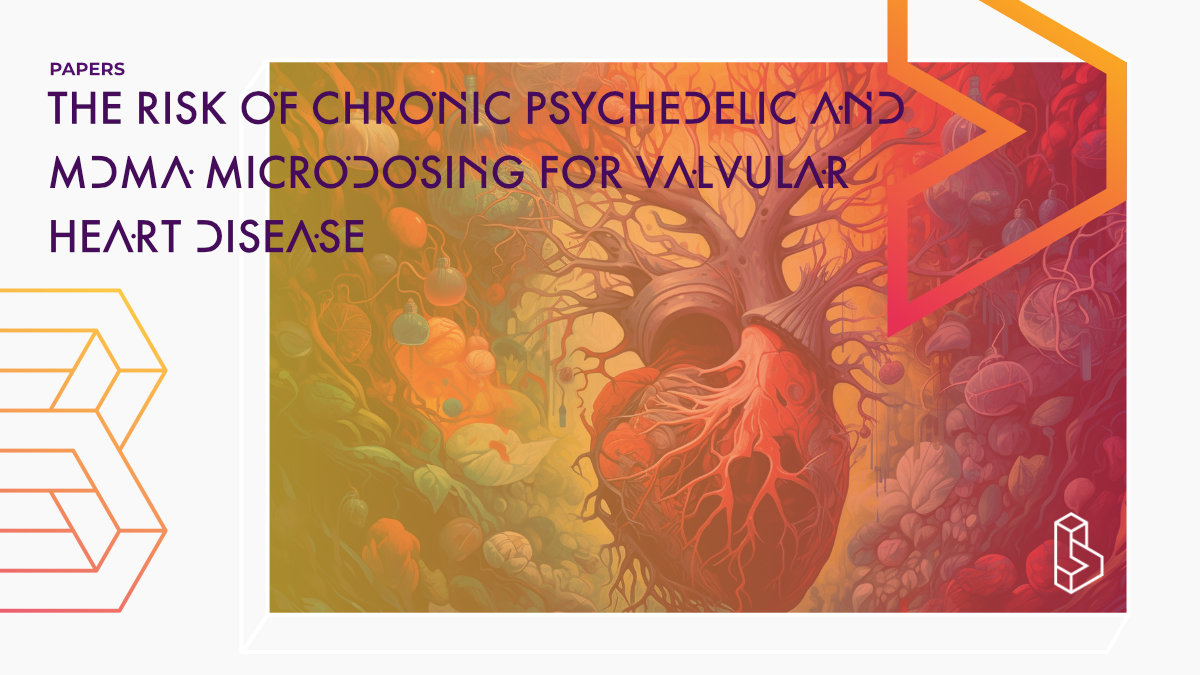This review (2023) covers in vitro, animal, and clinical studies to assess the potential risk of valvular heart disease (VHD) from microdosing psychedelic substances, focusing on LSD, psilocybin, mescaline, DMT, and MDMA due to their interaction with the serotonin 5-HT2B receptor. Findings show that all these compounds, except mescaline (due to low potency), were partial agonists at the 5-HT2B receptor. While safety margins from typical microdoses were greater than known valvulopathogens, there remains a potential risk. No studies directly evaluated VHD risk for the four psychedelics, but some evidence suggests chronic ingestion of full doses of MDMA might be linked to VHD.
Abstract of The risk of chronic psychedelic and MDMA microdosing for valvular heart disease
“Psychedelic microdosing is the practice of taking very low doses of psychedelic substances, typically over a longer period of time. The long-term safety of chronic microdosing is relatively uncharacterized, but valvular heart disease (VHD) has been proposed as a potential risk due to activation of the serotonin 5-HT2B receptor. However, this risk has not yet been comprehensively assessed. This analysis searched for all relevant in vitro, animal, and clinical studies related to the VHD risk of lysergic acid diethylamide (LSD), psilocybin, mescaline, N,N-dimethyltryptamine (DMT), and the non-psychedelic 3,4-methylenedioxymethamphetamine (MDMA). All five compounds and some metabolites could bind to the 5-HT2B receptor with potency equal to or greater than that of the 5-HT2A receptor, the primary target of psychedelics. All compounds were partial agonists at the 5-HT2B receptor with the exception of mescaline, which could not be adequately assessed due to low potency. Safety margins relative to the maximum plasma concentrations from typical microdoses were greater than known valvulopathogens, but not without potential risk. No animal or clinical studies appropriately designed to evaluate VHD risk were found for the four psychedelics. However, there is some clinical evidence that chronic ingestion of full doses of MDMA is associated with VHD. We conclude that VHD is a potential risk with chronic psychedelic microdosing, but further studies are necessary to better define this risk.”
Authors: Michael Tagen, Daniel Mantuani, Liron van Heerden, Alex Holstein, Linda E. Klumpers & Richard Knowles
Summary of The risk of chronic psychedelic and MDMA microdosing for valvular heart disease
The practice of microdosing psychedelics, which involves taking very low, sub-hallucinogenic doses of these substances over an extended period, has been gaining traction in recent years. People microdose for various reasons, including seeking improvements in mood, cognition, and creativity, as well as potential therapeutic benefits for conditions like headaches and neurological issues. However, despite its growing popularity, the long-term safety of chronic microdosing remains largely unknown.
This lack of data is concerning given the variety of psychedelic substances used for microdosing—including LSD, psilocybin, mescaline, DMT, and even the non-psychedelic MDMA—and the absence of standardised doses or schedules. The researchers highlight a particular theoretical risk associated with chronic microdosing: the development of valvular heart disease (VHD). This concern stems from the fact that many psychedelics, in addition to their primary action on the serotonin 5-HT2A receptor, also exhibit a high affinity for the 5-HT2B receptor. Activation of this receptor has been linked to VHD, a serious condition that can lead to heart failure and even death. The authors acknowledge previous mentions of this risk but point out that a comprehensive assessment of VHD risk associated with psychedelic and MDMA microdosing is lacking. This review aims to address this gap by examining the available in vitro, animal, and clinical data related to VHD risk for each substance.
Risk Assessment Strategies for VHD
Find this paper
The risk of chronic psychedelic and MDMA microdosing for valvular heart disease
https://doi.org/10.1177/02698811231190865
Paywall | Google Scholar | Backup | 🕊
Cite this paper (APA)
Tagen, M., Mantuani, D., van Heerden, L., Holstein, A., Klumpers, L. E., & Knowles, R. (2023). The risk of chronic psychedelic and MDMA microdosing for valvular heart disease. Journal of Psychopharmacology, 02698811231190865.
Study details
Compounds studied
LSD
Psilocybin
DMT
MDMA
Mescaline
Topics studied
Safety
Microdosing
Study characteristics
Literature Review

